NEWYou can now listen to Fox News articles!
On Sunday, less than a week after his inauguration for the fifth six-year term, Russia’s President Vladimir Putin, re-shuffled his entire cabinet, having launched a major offensive against Ukraine, as part of his war that crossed its third year mark earlier this year. The most significant change in this rare and unexpected move is Putin’s appointment, as the next minister of defense, of an economist, a civilian with no military background.
One might conclude that Putin – whose press secretary Dmitriy Peskov declared a few weeks ago the objectives of Russia’s so-called "special military operation" in Ukraine have been achieved – has decided to keep the roughly 20% of Ukraine’s territory controlled by the Russian armed forces and call it a day, wrapping up the assault on Russia’s post-Soviet neighbor. Why else would the Russian strongman replace Sergei Shoigu, his close ally who has served as Russia’s defense minister for the past 12 years and has presided over Russia’s assault on Ukraine since the very beginning?
Is peace in Ukraine and the Eurasian peninsula in the offing? Has Washington’s unwavering support to Kyiv, including billions in weaponry and cash provided to the Zelenskyy government, finally paid off, paving the way to the end of the killing of Ukrainians and Russians?
WHAT TO EXPECT FROM PUTIN AS RUSSIAN STRONGMAN BEGINS NEW SIX-YEAR TERM
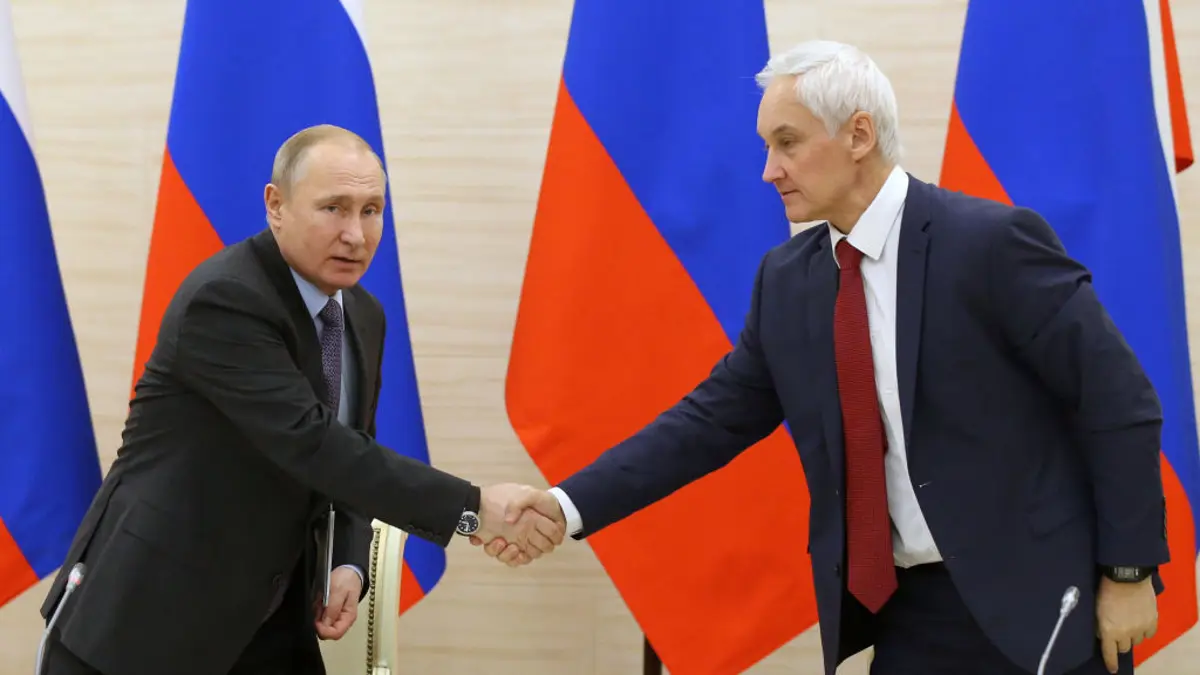
KALININGRAD, RUSSIA - JANUARY 08 (RUSSIA OUT) Russian President Vladimir Putin (L) greets Presidential Aide Andrey Belousov (R) during his meeting with governors and government officials on the development of local museums on January 08, 2019 in Kaliningrad, Russia. Vladimir Putin is on a one day visit to Kaliningrad, a Russian enclave in Europe. (Photo by Mikhail Svetlov/Getty Images) (Photo by Mikhail Svetlov/Getty Images)
Here is a look at who Andrey Belousov, former deputy Prime Minister and the new Defense Minister is, his relationship with Putin, and my analysis of what Putin’s wartime reshuffle tells us about the KGB spy master's plans for the war in Ukraine and Russia’s future relations with the United States.
Belousov is a veteran apparatchik in the Russian bureaucracy. During the past decade, he occupied several notable positions in the Russian government that ranged from an economic development minister and presidential economic assistant to acting prime minister and first deputy prime minister.
Here’s how Dmitriy Peskov, the Kremlin’s spokesperson, explained to the Russian press Putin’s rationale for this unusual appointment: "Today, the winner on the battlefield is the one who is more open to innovation, more open to implementation as quickly as possible." "It is natural that at the current stage the president decided that the Ministry of Defense should be headed by a civilian."
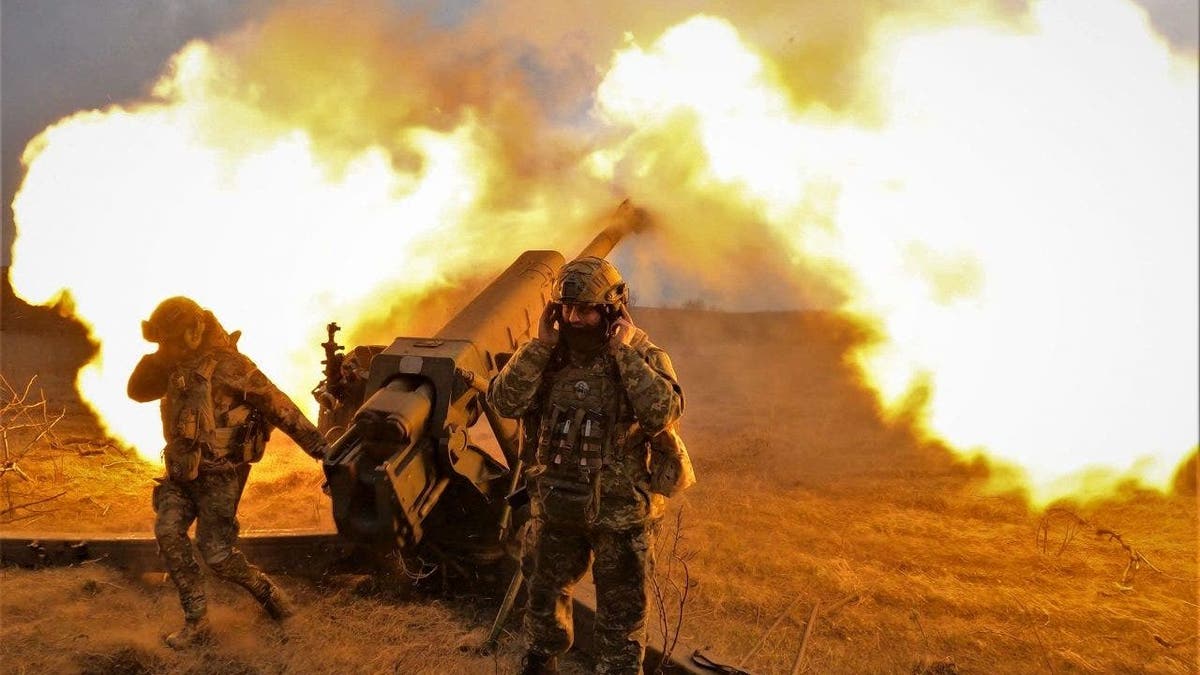
TOPSHOT - Ukrainian servicemen fire with a D-30 howitzer at Russian positions near Bakhmut, eastern Ukraine, on March 21, 2023, amid the Russian invasion of Ukraine. (Photo by Sergey SHESTAK / AFP) (Photo by SERGEY SHESTAK/AFP via Getty Images) (Photo by SERGEY SHESTAK/AFP via Getty Images)
Moscovskiy Komsomolets (Young Moscow Communist), a Russian newspaper whose views are aligned with the Russian state, called Belousov "a brainy strategist" and a "battle-tested and skilled bureaucratic fighter," meaning that he knows how to operate and fight battles within the Russian government bureaucracy.
Putin almost certainly wanted someone who will help him transition Russia onto a permanent wartime footing as he has embarked on a long-term confrontation with the United States, risking a full on war. The former KGB spymaster has no plans to end the conflict in Ukraine. His logic for appointing a civilian to lead his armed forces is directly opposite to that of Western thinking.
To the contrary, Putin views the conflict with the West over control of post-Soviet space in Eurasia as permanent. Its outcome is existential for Russia, in Putin’s view, and therefore a battle Moscow cannot lose. Why? Because Moscow views Ukraine (as well as other former Soviet states) as the key element of its strategic buffer zone against NATO, Russia’s version of the Monroe Doctrine.
AS SOMEONE WHO GREW UP IN SOVIET RUSSIA, DON'T LET AMERICA TURN INTO A GODLESS NATION
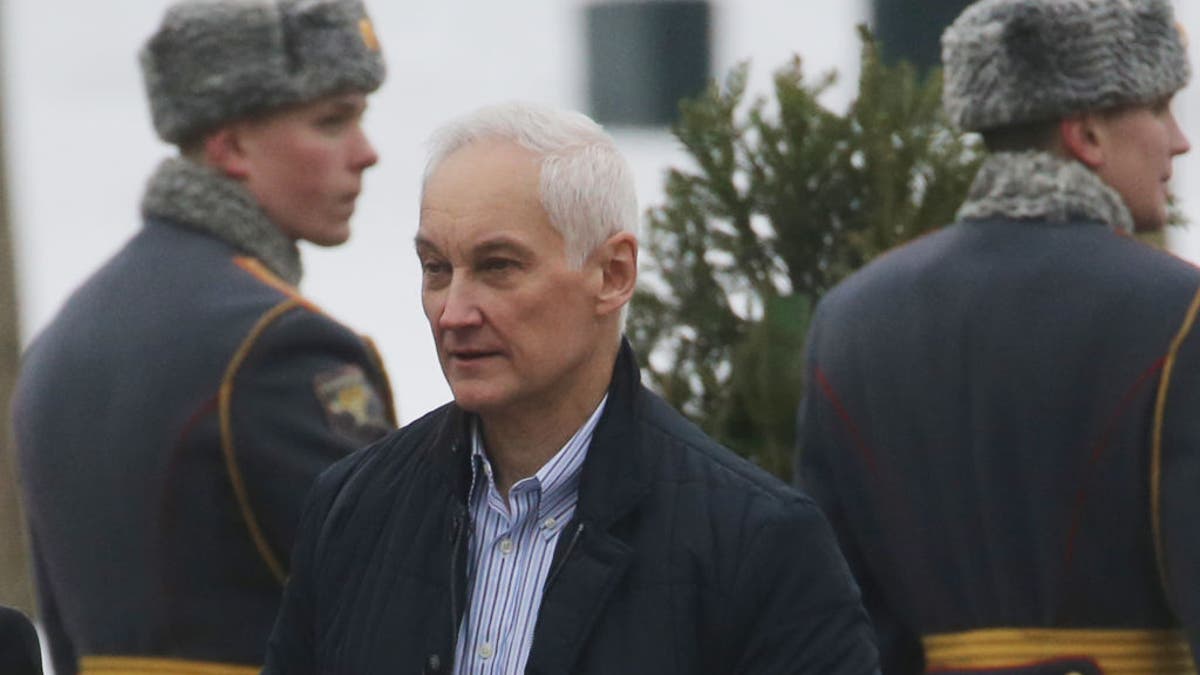
MOSCOW, RUSSIA - MAY 13: (RUSSIA OUT) Russian First Deputy Prime Minister Andrey Belousov takes flowers to the Unknown Soldier's Tomb on May 13, 2024, in Moscow, Russia. President Putin named Belousov as Defence Minister on May 12. (Photo by Contributor/Getty Images) (Photo by Contributor/Getty Images)
Putin and the Russian defense establishment believe that Russia lost the Cold War to the United States because its economy could not possibly sustain the requirements placed on it by the Soviet military that sought to outcompete the U.S. military and defense establishment. The Russians want to avoid a repeat of that failure. Here’s the explanation given by Moscovskiy Komsomolets for the USSR’s loss of the Cold War. "People who were in charge of the economy during the Gorbachev era … transformed the Soviet economic model that was already ineffective into a non-viable and even moribund."
Putin, who has a Ph.D. in economics, in addition to being an attorney, almost certainly seeks additional intellectual firepower in the economic realm, as he seeks to beat the United States in what Russia views as a proxy war over control of Ukraine. During the first two years of the war, he relied on his own knowledge and the expertise of his MIT-trained Central banker Elvira Nabiulina who is highly respected in the West, to mitigate the effects of U.S. and European economic sanctions on Russia.
In the anticipation of the sanctions, prior to the invasion, Putin began sanction-proofing Russia’s economy approximately seven years before the invasion of Ukraine. Measures included de-dollarizing Russia’s economy in favor of the Chinese yuan, beefing up Russia’s sovereign fund, and introducing an import substitution program to minimize reliance on Western technologies. That is why the U.S. and European sanctions had only a marginal negative impact on Russia’s economy, whose growth has been boosted, despite the sanctions, by the military-industrial complex. Economic sanctions never changed Putin’s decision calculus regarding Ukraine as Moscow always prioritizes its security interest above anything else, including its economic considerations.
CLICK HERE TO GET THE OPINION NEWSLETTER
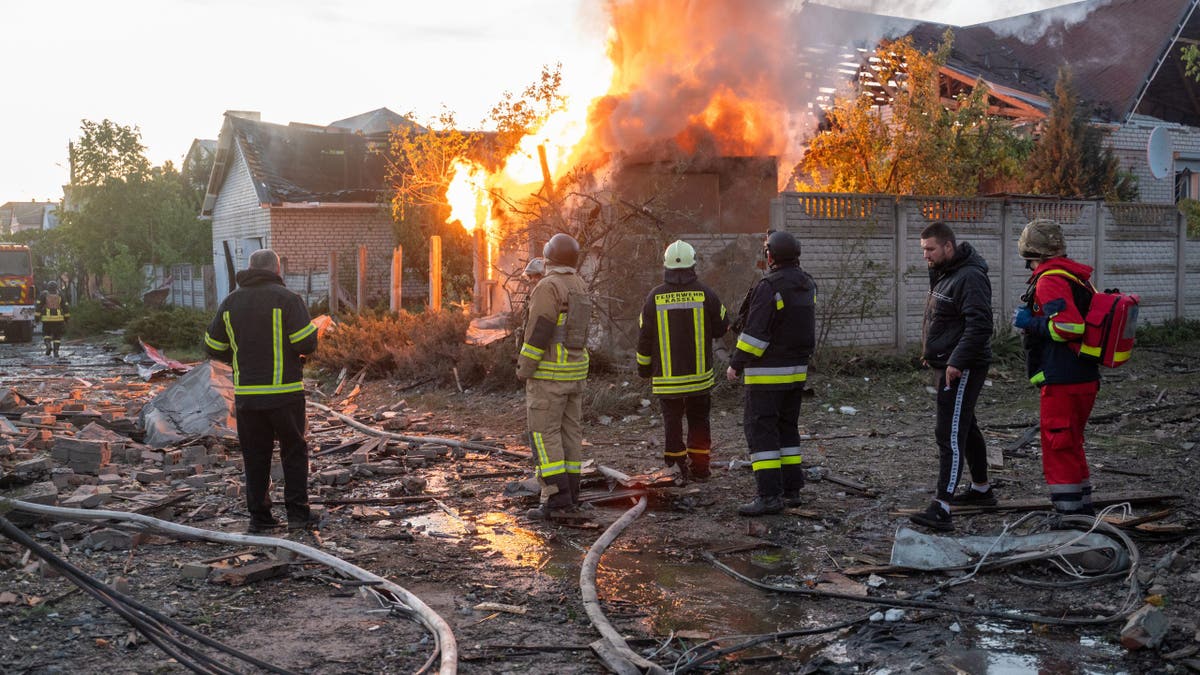
A view from the site aftermath of the explosion of a Russian missile (according to the Ukrainian authorities, S-400) in the area of a cottage residential development in Kharkiv, Ukraine on May 10, 2024. (Stringer/Anadolu via Getty Images)
But as he embarks on a permanent confrontation with the West that risks, in the Kremlin’s assessment, a direct kinetic war with the United States, Putin likely feels the need for a more in depth economic expertise possessed by a male. As much as he respects Nabiulina, the former KGB operative is acutely aware that the Russian defense establishment cannot possibly tolerate being led by a female.
The two men have utmost trust, which is the most valuable asset in Russian politics. The trust of the first person (pervoye litso), the moniker used by the Russian media for Putin, that he himself started in his official autobiography "First Person" (Ot Pervogo Litsa). They see eye to eye, being completely ideologically like-minded, including when it comes to Russia’s invasion of Crimea in 2014 and of Ukraine in 2022.
Putin is acutely aware of the economic conditions of his key perceived adversaries, the United States and NATO. He assesses that the trillions of dollars of U.S. debt and its domestic economic hardships will not allow Washington to flow military aid to Ukraine indefinitely. He is also acutely aware that NATO members – most of whom aren’t contributing even two percent of their GDP towards collective defense – are not keen on giving up their social safety net benefits to fund what is turning out to be a protracted war in Ukraine. Thus, Belousov is installed to figure out how to keep Putin’s war machine operational as long as needed, to keep Ukraine away from NATO and within Moscow’s sphere of influence.
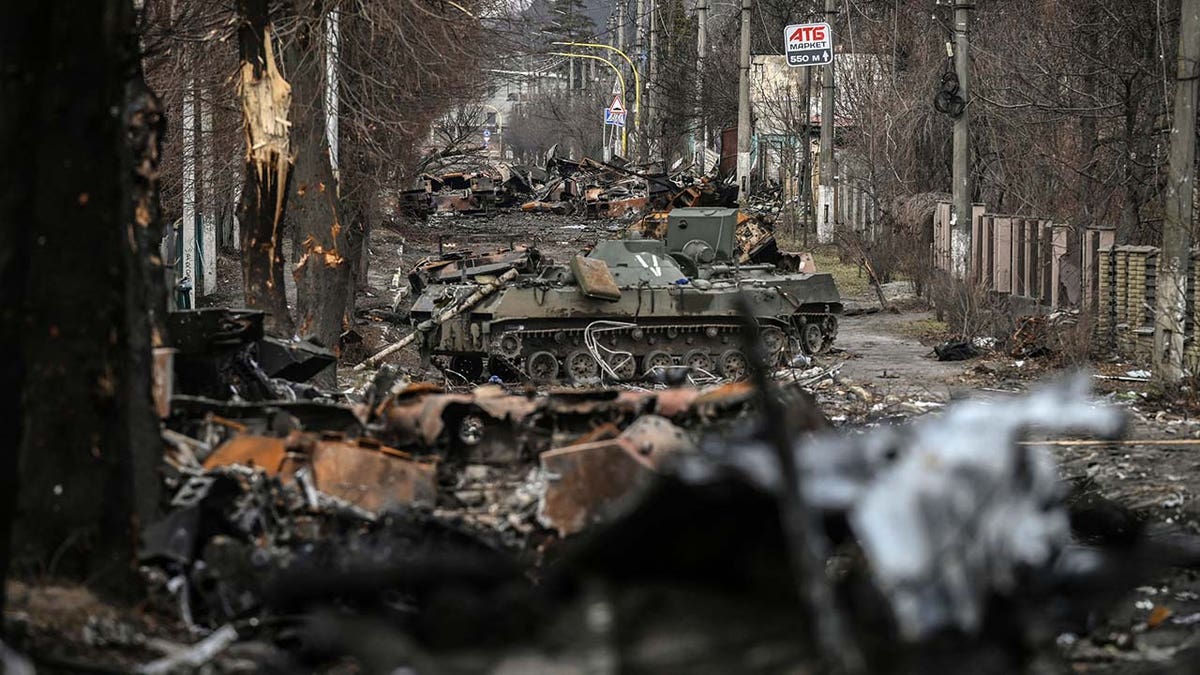
Destroyed Russian armored vehicles line the street in the city of Bucha, west of Kyiv, on March 4, 2022. - The UN Human Rights Council on March 4, 2022, overwhelmingly voted to create a top-level investigation into violations committed following Russia's invasion of Ukraine. More than 1.2 million people have fled Ukraine into neighbouring countries since Russia launched its full-scale invasion on February 24, United Nations figures showed on March 4, 2022. (Photo by ARIS MESSINIS/AFP via Getty Images)
What Putin secretly admires about the Americans, although he vehemently despises its values, is the capitalist nature of its economy, which, ironically, many Democrats and young Americans seek to turn into a Soviet-style socialist enterprise. By appointing Belousove, Putin seeks to beat the U.S. at its own game of economic efficiency.
"The new Minister of Defense will not be dealing with mercantile frugality," writes Moscovskiy Komsomolets. "There will not be any thoughtless "optimizations" . . . Belousov is the proponent of instituting effective processes, the kind that work with maximum return on investment." These are words from the capitalist lexicon, to be sure.
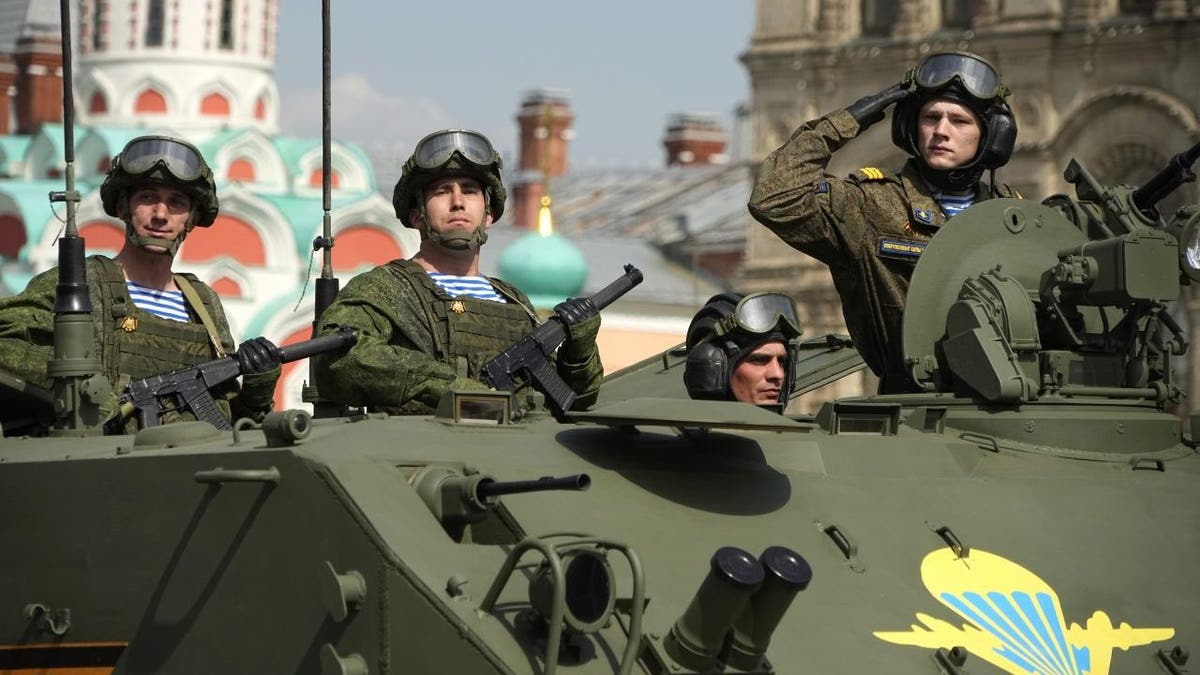
Russian Army soldiers stand in a military vehicle rolling during a dress rehearsal for the Victory Day military parade in Moscow, Russia, Saturday, May 7, 2022. The parade will take place at Moscow's Red Square on May 9 to celebrate 77 years of the victory in WWII. (AP Photo/Alexander Zemlianichenko) (AP Photo/Alexander Zemlianichenko)
In a geopolitical sense, this means that Russia is preparing for a long, and possibly for an even graver, military conflict. The appointment of Belousov is a testament to the fact that Putin clearly sees such a possibility and is actively looking for an antidote to it. Belousov’s main task is to replace "is looking for" with "have found."
CLICK HERE TO GET THE FOX NEWS APP
Recently, Russian Foreign Minister Sergei Lavrov, who will remain in his position, summarized the essence of Belousov’s appointment by Putin: "… if they [the West] want it to be on the battlefield, it will be on the battlefield." But in the back of Putin’s mind is the possibility of an even bigger problem on his hands – an all out war with the United States and NATO, who, at least thus far, have signaled to Moscow that they are not about to abandon the fight for Ukraine.
Putin views Belousov as а roadmap to a clear victory in Ukraine and an antidote capable of deterring a broader war with the U.S. and NATO. Whether Putin has found this antidote in Belousov remains to be seen.
CLICK HERE TO READ MORE FROM REBEKAH KOFFLER
"behind" - Google News
May 16, 2024 at 07:00PM
https://ift.tt/0DOl2x5
Who is Russia's new defense minister and what's behind Putin’s wartime cabinet reshuffle? - Fox News
"behind" - Google News
https://ift.tt/5TQorIm
https://ift.tt/cX3pmQJ
Bagikan Berita Ini














0 Response to "Who is Russia's new defense minister and what's behind Putin’s wartime cabinet reshuffle? - Fox News"
Post a Comment